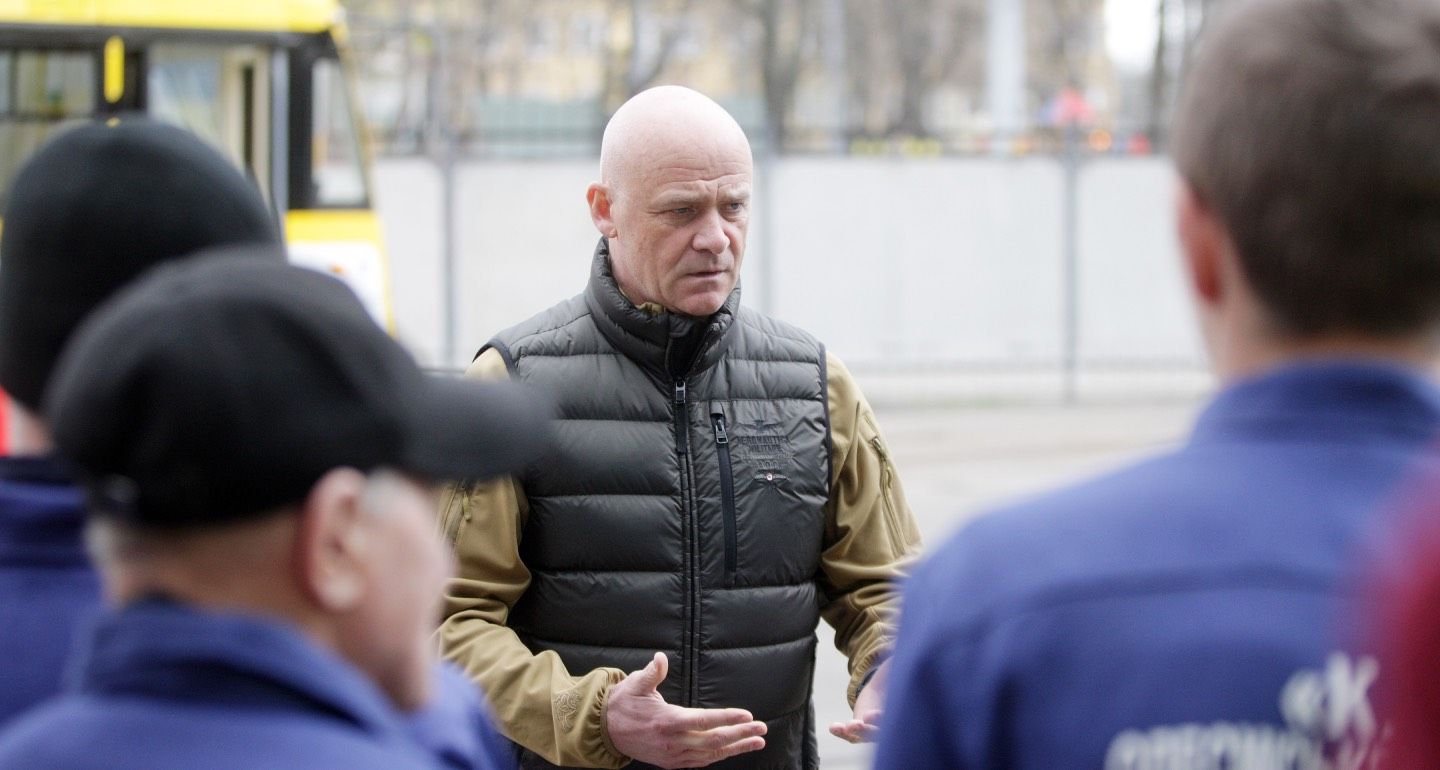Western negotiators often believe territory is just a bargaining chip when it comes to peace in Ukraine, but Putin is obsessed with empire-building.
Andrey Pertsev
{
"authors": [
"Konstantin Skorkin"
],
"type": "commentary",
"blog": "Carnegie Politika",
"centerAffiliationAll": "",
"centers": [
"Carnegie Endowment for International Peace",
"Carnegie Russia Eurasia Center"
],
"collections": [
"Politika: The Best of 2025"
],
"englishNewsletterAll": "",
"nonEnglishNewsletterAll": "",
"primaryCenter": "Carnegie Russia Eurasia Center",
"programAffiliation": "",
"programs": [],
"projects": [],
"regions": [
"Ukraine"
],
"topics": [
"Domestic Politics",
"Civil Society",
"Political Reform"
]
}
The Odesa mayor is a controversial figure around whom the president’s opponents are unlikely to gather. But the methods used to remove him have not gone down well with either the Ukrainian public or the West.
Odesa Mayor Hennadiy Trukhanov’s loss of Ukrainian citizenship and effective ouster is the latest move in President Volodymyr Zelensky’s attempts to regulate oversight of parts of the war-torn country run by regional heavyweights. Having failed to reshape local politics to their liking at the beginning of his presidency, Zelensky and his team are out to compensate for their defeat in the 2020 local elections.
Martial law, which has been in place in Ukraine since Russia’s full-scale invasion in February 2022, has made this much easier. When the decentralization project that Ukraine has pursued since 2015 clashes with wartime recentralization, the latter prevails more often than not. Endemic corruption among regional elites also simplifies Kyiv’s task: any curtailing of democracy can be justified with a slew of criminal cases and compromising information. However, the Ukrainian public and the West are starting to sour on Zelensky’s heavy-handed tactics.
Local elections in October 2020 were the first painful blow for Zelensky and his team. After the previous year’s electoral revolution, when the young president’s name was enough for any unknown candidate to defeat an experienced politician in the parliamentary elections, a hangover set in. The first serious complaints against the authorities emerged, and Zelensky’s Servant of the People party lost its immunity to the general distrust of political parties. Regional clans seized the opportunity to create puppet parties, which captured regional and city parliaments.
As a result, Servant of the People was unable to get its mayoral candidates elected in any regional center. Zelensky’s candidate even lost the mayoral election in the president’s hometown of Kryvyi Rih. Kharkiv’s election was particularly illustrative: incumbent Hennadiy Kernes, representing his own political party, managed to get reelected despite being in a coma from COVID-19 complications during his campaign. He died soon after his victory.
In Odesa, voters also reelected the incumbent mayor, Trukhanov, who had run the city since 2014. Trukhanov is an infamous figure notorious for his criminal connections: the retired Soviet army officer founded his own security agency and was actively involved in Odesa’s criminal underworld during the 1990s. Then, in the 2000s, he was closely associated with Russian business interests, particularly the oil company Lukoil. In 2016, the Panama Papers revealed that he had registered offshore companies using a Russian passport.
Trukhanov may have had a pro-Russian position at times, but ultimately he remained loyal to Ukraine (not least for the sake of his business interests), making him an important compromise figure in Kyiv’s relations with elites in the southeast of Ukraine after Russia’s first invasion in 2014.
Unsurprisingly, Trukhanov has also been the subject of several anti-corruption investigations. He has been dogged by allegations of embezzlement, false asset declarations, and illegal appropriation of factory premises, leading to brief arrests in 2018 and 2023.
All this made Trukhanov a toxic figure for local Ukrainian nationalists and liberals, but an acceptable choice for more conservative Odesa voters. His rumored Russian citizenship did not prevent him from winning the 2014 mayoral election, and it would not be accurate to describe him as a pro-Kremlin politician. Indeed, his subsequent main challenger in 2020 (whom Trukhanov again triumphed over) was not a member of Servant of the People, but a Russian media–backed candidate, Mykola Skoryk. But for Zelensky’s team, Trukhanov had grown too influential for comfort.
Amid the pressures of war, the president’s team has resorted to utilizing tools with shaky legal grounds in its fight against opponents. These include sanctions against citizens by Ukraine’s National Security and Defense Council and closed presidential decrees revoking citizenship.
Zelensky has already used the latter against a number of other controversial figures: the oligarch Ihor Kolomoisky and Dnipro businessman Hennadiy Korban, who fell out with Andriy Yermak, head of the Office of the President, as well as Metropolitan Onufriy, head of the Ukrainian Orthodox Church of the Moscow Patriarchate. All three individuals had dual citizenship, which is prohibited by Ukrainian law.
Now Trukhanov is getting the same treatment. However, the foreign passport presented by Ukraine’s security service, the SBU, caused a scandal when it turned out to be fake,though the Panama Papers evidence suggests that Trukhanov does hold a genuine Russian passport.
After losing his Ukrainian citizenship, Trukhanov will likely lose his mayoral post, though he is determined to fight for it. Backing him are a segment of Odesans and local businesses frustrated with Kyiv’s meddling. In the end, Trukhanov has no choice but to fight—he cannot flee to Russia, where he is seen as a traitor to the “Russian World.”
Martial law does not permit new elections in Odesa. Power will be divided between the secretary of the city council, who will be acting mayor until a new one is elected, and the head of Odesa’s civil-military administration. The former was elected from Servant of the People, and Zelensky swiftly appointed former Dnipropetrovsk region SBU head Serhiy Lysak as the latter.
Trukhanov’s fall serves as an unambiguous warning to other rebellious mayors, including Kyiv’s Vitali Klitschko, Dnipro Mayor Borys Filatov, and Kernes’s successor in Kharkiv, Ihor Terekhov.
Martial law has helped Zelensky get rid of many political irritants. Trukhanov is not the first mayor of a major city to be toppled. In April 2023, Poltava Mayor Oleksandr Mamay was fired and given a suspended sentence for embezzlement. Chernihiv mayor Vladyslav Atroshenko was also accused of abusing his power and removed from his post.
Most of these leaders went down for corruption or other abuses. However, this does not negate the fact that they were elected by their communities, and their removal appeared to be politically motivated.
Grassroots reform, which granted local authorities significant powers and financial independence, was one important achievement of the 2014 revolution. Ukraine had seemingly managed to resolve its long-standing dispute over the merits of unitarianism versus federalism: it would be a unified country, but with strong regions.
However, war with Russia is again pushing Kyiv toward a centralized model, with regional military-civilian commissaries. The longer the war lasts, the more local autonomy will be eroded.
Experts point out that Ukraine’s decentralized system passed the litmus test of war: using their own power and resources, regional authorities quickly resolved matters of defense without having to wait on commands from Kyiv. This stands in stark contrast to governance in Russian-occupied territories, where mayors and village heads are seen as wholly dependent on central authority.
Local governance in Ukraine is still far from ideal, of course. Its problems remain the same: corruption, nepotism, and inefficient management. But in the absence of elections, is tightening the screws really going to solve those problems?
There is another important aspect to consider. Trukhanov is often criticized as a member of the prewar pro-Russian elite who can no longer be trusted. However, it was precisely people like him who helped ensure stability in southeastern Ukraine during the invasion, when former pro-Russian politicians split into both “traitors” and defenders of their country.
Oleksandr Vilkul is a good example. He was governor of the Dnipropetrovsk region under former president Viktor Yanukovych and an Opposition Bloc leader; now he serves as the head of Kryvyi Rih’s military administration. He too faces complaints, but by removing compromise figures like him, the president’s team risks upsetting the balance in a complex region that remains a Russian military target.
The spectacular power plays for which Zelensky’s team is famous are increasingly backfiring. Recently, their attempt to limit the powers of anti-corruption agencies ended in complete failure, triggering the first street protests since the war began.
Their curtailing of local autonomy is more of the same. By centralizing power—whether to optimize governance or to prepare for hypothetical elections—Zelensky is undermining the consensus that has emerged among Ukraine’s elites and society. Trukhanov is not the sort of figure that Zelensky’s opponents can rally around. But the methods used to remove him from office do not elicit sympathy or understanding in either Ukrainian society or the West. Unless Zelensky and his team grapple with the discontent building up in Ukrainian society, the cost of another misstep will only increase.
Carnegie does not take institutional positions on public policy issues; the views represented herein are those of the author(s) and do not necessarily reflect the views of Carnegie, its staff, or its trustees.
Western negotiators often believe territory is just a bargaining chip when it comes to peace in Ukraine, but Putin is obsessed with empire-building.

Andrey Pertsev
The story of a has-been politician apparently caught red-handed is intersecting with the larger forces at work in the Ukrainian parliament.

Konstantin Skorkin
For years, the Russian government has promoted “sovereign” digital services as an alternative to Western ones and introduced more and more online restrictions “for security purposes.” In practice, these homegrown solutions leave people vulnerable to data leaks and fraud.

Maria Kolomychenko
It’s one thing to export Russian helicopters to Iran to fight the insurgency, and it’s easy to imagine Moscow becoming a haven for fleeing Iranian leaders. But it’s very difficult to imagine Russian troops defending the Iranian regime on the ground.

Nikita Smagin
While appointing Kyrylo Budanov will help shore up Zelensky’s political authority and balance the president’s inner circle, the spy chief’s political ambitions mean he could be a threat.

Konstantin Skorkin